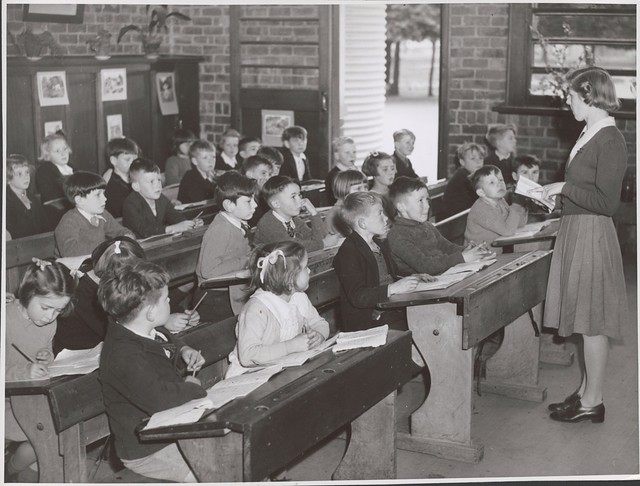
© 1944 National Library of Australia, Flickr | PD | via Wylio
If a student an I are having a bad day — a fortunately rare coincidence, but one that nevertheless still happens — sometimes our conversation can denigrate into one that is not helpful to anyone.
Marvin Marshall, who writes a lot about positive classroom management techniques, offers some good advice in that situation:
The Person Who Asks The Questions Controls The Conversation
In other words, if the conversation is going south, asking a question could be one way to get it on track again — “What do you think we should do about this situation?”; “What do you think would help fix this problem?”; “How is what is happening now contributing to any goal you have for the future?”; “How could we deal with this situation in a way that would help you achieve a goal you want for the future?”
Obviously, students can offer retorts that are not constructive to any of those questions, too, but the strategy is worth keeping in mind.
As is other advice Marvin has offered, which I think is the best classroom management guidance I’ve ever heard:
Will what I am about to do or say bring me closer or will it push me away farther from the person with whom I am communicating?
Do you have any good one-sentence classroom management advice that’s good and easy for teachers to remember?
I’m adding this post to The Best Posts On Classroom Management.



Definitely a great strategy! Some of the things I do depend on the types of questions I’m being asked – if they’re information seeking questions where it’s obvious I’m repeating what’s already been said and seems more like a distraction, I simply answer them and make clear that I’m moving on. If it’s unrelated to what we’re doing, I would try to ask a question about the material we’re working on, sort of side-stepping the “why are we doing this” type question. I tend to keep repeating that sort of line, the related-to-the-content line until they do what I’m asking. Then, I would ask the kinds of questions above that you posted in a one on one conversation at the end of the period, to check in and see what the issue was. If it continues though or if it’s becoming a power struggle, I think these would be great to stop a student in his/her tracks and make them really think, if for no other reason than being such an unexpected question. I teach 17 yr olds, so sometimes their wit is quicker than I would expect, so asking some of these questions might illicit some surprising come-backs from kids. So again, I think I would try to stick with the classroom plan of what we’re doing and then come back to them later, but in the midst of a power struggle, they may definitely come in handy! I will certainly start framing my responses as questions though – I think that’s really powerful in that type of conversation with a student.
Here is the question that is neatly posted up high, in bold print, at the back of my classroom–directly across the room from where I am standing or sitting when I am using the document camera: “What would love do now?”
It is similar to the one you posted and reading it has saved me from opening my mouth on many an occasion. Reading that sign slows me down, forces me to listen, and helps me to remember that the students with whom I share a classroom are young people who other people love…
Great question, Dana. Thanks!
One that keeps me from getting into arguments with students when I ask them to do something they don’t want to hear is, “I know you want my answer to change, but it’s not going to.”